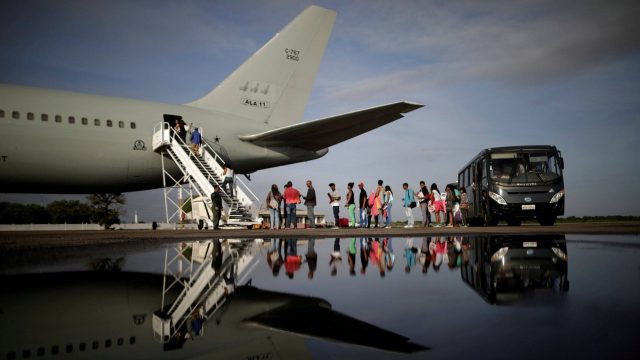Since 2017, the political crisis in Venezuela has seen nearly four million citizens flee the country, seeking relief from severe food and medicine shortages. More than 50,000 of them have fled across the border into Brazil.
But in Brazil’s remote border regions, the influx of desperate migrants is making them easy prey for human traffickers who falsely promise them food and shelter in exchange for work.
Still, as Brazil enters its election season, protecting thousands of Venezuelans on the border from exploitation is not a priority for politicians.
In an opinion piece for the New York Times, journalist Chris Feliciano Arnold writes:
During a pivotal election season, the chaos in the borderlands mirrors turmoil nationwide. After years of economic malaise, corruption investigations and security breakdowns, many Brazilians crave stability, law and order. Welcoming thousands of Venezuelans checks none of those boxes.
At least 10 Venezuelans have been rescued from slavery in the past year. Yet the abuse of refugees at the hands of powerful businessmen and landowners is but another stunning example of how crime pays in Brazil.
In Boa Vista, the Federal Police have investigated numerous reports of women forced to provide sex for food or shelter. Bosses from remote fazendas — large ranches — scout the camps, making false promises about room, board and wages to abscond with laborers to farms and mines along the BR-174 highway and in other states in the Brazilian Amazon.
Isabel Marquez, a representative of the United Nations Refugee Agency, says conditions are “extremely worrying.”
“Some come back at the end of the week. Some come back at the end of the month. Some of them are paid. Some of them not paid.”
Brazil’s own National Task Force for the Eradication of Slave Labor has promised to increase its rescue and inspection efforts as the flow of Venezuelans migrants and refugees increases.
For Arnold, Brazilian politicians must not scapegoat trafficked Venezuelan migrants from Venezuela ahead of Brazil’s snap election on May 20.
“The country deserves leaders who will act swiftly to protect the vulnerable from exploitation and restore Brazil’s credibility in the region — not use the crisis to stoke xenophobia and nationalism,” he writes.







Freedom United is interested in hearing from our community and welcomes relevant, informed comments, advice, and insights that advance the conversation around our campaigns and advocacy. We value inclusivity and respect within our community. To be approved, your comments should be civil.
same as the new york times article